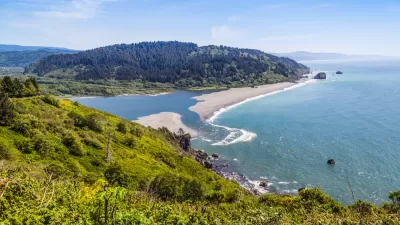A new biological opinion sets policy for the Federal Columbia River Power System until 2018. Critics say the new plan continues the unsuccessful status quo of habitat restoration—instead they want to spill water over four dams on the Snake River.
The National Oceanic and Atmospheric Administration recently released a court-mandated biological opinion for the operation of the Federal Columbia River Power System (FCRPS). The biological opinion follows the most recent version of the plan, adopted in 2008, and a subsequent biological opinion from 2010. The plan was struck down in court in 2011. The new biological opinion has renewed an ongoing controversy about the efficacy of habitat restoration in restoring the 13 species of Columbia River Basin salmon and steelhead listed for protection under the Endangered Species Act (ESA).
Critics of the most recent biological opinion, including environmental groups and the Nez Perce Tribe, cite the lack of improvement in salmon population as a sign that the traditional strategy of habitat restoration is not working. They would rather explore the breaching of four dams (i.e., increasing the water until it can spill over the tops of the dams) along the Snake River, which is a tributary of the Columbia River. Breaching, it’s hoped, would make passage along the river easier for endangered salmon and steelhead. But spilling water over the dam comes at the cost of the potential for that water to produce electricity.
FULL STORY: New Columbia River plan for protecting salmon and steelhead is little changed

Alabama: Trump Terminates Settlements for Black Communities Harmed By Raw Sewage
Trump deemed the landmark civil rights agreement “illegal DEI and environmental justice policy.”

Study: Maui’s Plan to Convert Vacation Rentals to Long-Term Housing Could Cause Nearly $1 Billion Economic Loss
The plan would reduce visitor accommodation by 25% resulting in 1,900 jobs lost.

Planetizen Federal Action Tracker
A weekly monitor of how Trump’s orders and actions are impacting planners and planning in America.

Waymo Gets Permission to Map SF’s Market Street
If allowed to operate on the traffic-restricted street, Waymo’s autonomous taxis would have a leg up over ride-hailing competitors — and counter the city’s efforts to grow bike and pedestrian on the thoroughfare.

Parklet Symposium Highlights the Success of Shared Spaces
Parklets got a boost during the Covid-19 pandemic, when the concept was translated to outdoor dining programs that offered restaurants a lifeline during the shutdown.

Federal Homelessness Agency Places Entire Staff on Leave
The U.S. Interagency Council on Homelessness is the only federal agency dedicated to preventing and ending homelessness.
Urban Design for Planners 1: Software Tools
This six-course series explores essential urban design concepts using open source software and equips planners with the tools they need to participate fully in the urban design process.
Planning for Universal Design
Learn the tools for implementing Universal Design in planning regulations.
Caltrans
Smith Gee Studio
Institute for Housing and Urban Development Studies (IHS)
City of Grandview
Harvard GSD Executive Education
Toledo-Lucas County Plan Commissions
Salt Lake City
NYU Wagner Graduate School of Public Service





























